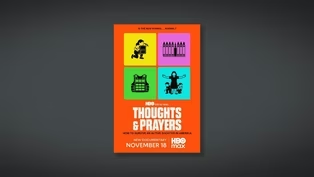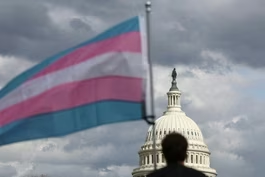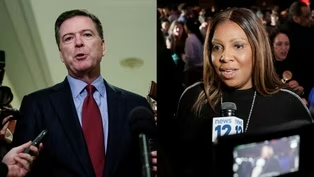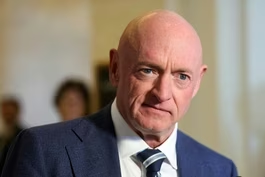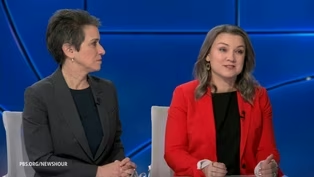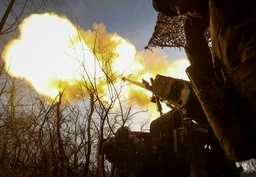
ICE agents arresting migrants at mandatory court check-ins
Clip: 11/24/2025 | 6m 50sVideo has Closed Captions
'Deportation trap': Immigration agents arresting migrants at mandatory court check-ins
A sweeping new investigation by the Associated Press is raising serious questions about what’s happening inside America’s immigration courts. White House Correspondent Liz Landers reports on how the administration has short-circuited the asylum process.
Problems playing video? | Closed Captioning Feedback
Problems playing video? | Closed Captioning Feedback
Major corporate funding for the PBS News Hour is provided by BDO, BNSF, Consumer Cellular, American Cruise Lines, and Raymond James. Funding for the PBS NewsHour Weekend is provided by...

ICE agents arresting migrants at mandatory court check-ins
Clip: 11/24/2025 | 6m 50sVideo has Closed Captions
A sweeping new investigation by the Associated Press is raising serious questions about what’s happening inside America’s immigration courts. White House Correspondent Liz Landers reports on how the administration has short-circuited the asylum process.
Problems playing video? | Closed Captioning Feedback
How to Watch PBS News Hour
PBS News Hour is available to stream on pbs.org and the free PBS App, available on iPhone, Apple TV, Android TV, Android smartphones, Amazon Fire TV, Amazon Fire Tablet, Roku, Samsung Smart TV, and Vizio.
Providing Support for PBS.org
Learn Moreabout PBS online sponsorshipAMNA NAWAZ: A sweeping new investigation# by the Associated Press is raising serious## questions about what's happening# inside America's immigration courts.
White House correspondent Liz Landers# has more on how the administration has## circumvented the asylum process.
LIZ LANDERS: Every day, all across## the country, asylum cases are being tossed out,## and asylum seekers exit the courtroom into the# waiting arms and cuffs of immigration officers,## that according to a new report from the# Associated Press headlined "Migrants## thought they were in a court for a routine# hearing.
Instead, it was a deportation trap."
One of its authors, Josh Goodman, joins us now.
Josh, thank you for joining the "News Hour."
JOSH GOODMAN, Associated Press: Thank you.
LIZ LANDERS: In reporting this story, you and you.. describe the scene as you watch migrants walk# into court and then walk out into a legal snare?
JOSH GOODMAN: Yes, we witnessed multiple# arrests over several months.
This was a## routine practice by which government attorneys# would go before a judge, dismiss a case,## which would typically be a good outcome for# someone trying to stay in the United States.
And as soon as they would leave the courtroom,# they would be arrested by ICE agents or federal## agents, frequently with masks.
Nationwide, it's# estimated that there were over 2,000 arrests## in this manner.
Some of the courts were quite# chaotic, arresting people in hallways.
People## were being trapped in elevators.
Journalists# were being rough-handled, scenes of fathers## being torn from their children, women begging# federal agents to let their husbands go.
These are people who wanted to follow the# rules.
They didn't have a criminal record.## They were making an asylum claim# and going through all the stages## that are required and were completely# blindsided by what happened to them.
LIZ LANDERS: What has changed in these immigration# courts under this new Trump administration?
JOSH GOODMAN: So these immigration courts# were kind of structurally flawed from the## very beginning.
They are not part of the# independent judiciary in the way that tax## court or federal court or any multiple# courts around the United States are.
They are part of the executive branch.
They# actually are part of the Justice Department.## They had a degree of professionalism over time# that was built up.
And these judges were allowed## to really rule like any other court.
But they were# always very vulnerable to some sort of takeover.
What we have seen now under the second# Trump administration, they are effectively## exploiting those vulnerabilities, issuing new# orders about what judges can and cannot rule## on.
And they're really narrowing the scope# that these judges have to decide the cases.
LIZ LANDERS: How do the attorneys and judges# within the immigration court system feel about## the role that they're playing under# this new Trump administration tactic?
JOSH GOODMAN: What I found is that overall# these are people who are very patriotic.## They signed up to work in the immigration system# because they wanted to protect America's borders,## root out the true people who need# asylum from some of the people who## are claiming it for nonlegal reasons# or economic refugees, for example.
And they did not sign up for this at# all.
One of the judges I talked to said,## this is really like deciding death penalty cases# in a traffic court environment, because they have## so few tools to actually mete out justice that --# and they have such a huge docket -- that they are## rushing through these cases without giving# them the due consideration that they need.
And I noticed in some of the text# messages between the federal agents## and the attorneys a great deal of empathy# and people kind of saying to themselves,## this is cruel and we don't# really want to be a part of this.
LIZ LANDERS: I was struck by that in# your reporting, that these attorneys## who are arguing in front of these# judges are in direct contact, it seems,## with the ICE agents who are waiting outside.
JOSH GOODMAN: This process starts about two weeks# in advance.
Every attorney is assigned a number of## people, like maybe 40 cases that day.
They have# to come up with a list for the client -- the## client here is ICE -- of people who they would --# quote, unquote -- call "amenable" to detention.
And then, on the day of the hearings, the# attorney and the ICE officer in the hallway are## coordinating almost in real time so that they# can identify what the individual looks like,## what kind of shirt, black shirt, a# white shirt, whatever they're wearing,## as well as if indeed the judge dismissed# the case, because that was the hook.
If the judge didn't dismiss the case,# they couldn't arrest these individuals.## If they're trying to reach a quota every day,# it's a lot easier to pick up people at court.
LIZ LANDERS: One of the stated reasons that# the Trump administration has adopted this## new policy is to work through the# asylum system's yearslong backlog.## Is it affecting the backlog and# is it affecting other systems?
JOSH GOODMAN: That's a great question.
The# backlog is a huge challenge.
It has been## for many, many years.
It keeps growing.
The# numbers themselves are not 100 percent clear.
The government has said that they have# managed to reduce the backlog from about## 4.2 million to 3.8 million cases, which is still# mind-boggling for only 600 judges nationwide.
But## they're also benefiting from the fact that# the border itself is sealed.
In other words,## there's not a lot of new people# coming in and clogging up the system.
But every time that there are arrests in the# streets, any time there are major roundups,## those people also get sort of# thrown back into the system,## and they can actually increase the numbers.# So, it's not entirely clear, but I think,## at a very minimum, what we can say is that the# backlog is not growing as fast as it once was.
LIZ LANDERS: So you find in this reporting that# a number of these judges, these immigration court## judges have been laid off.
You guys profile in# your story a judge in Ohio who had been fired.
Why are immigration judges getting fired right now# if there is such a backlog to process these cases?
JOSH GOODMAN: Yes, I mean, this is# a great conundrum.
There's about 90## judges that have been fired since February.# And the government, Trump administration,## very clearly says that they are not targeting# anyone from a viewpoint perspective.
But the data speaks for itself.# These judges were more favorable to## migrants than the national average.
LIZ LANDERS: Josh Goodman, thank# you so much for joining us.
JOSH GOODMAN: Thank you for having me.
Documentary explores industry built around school security
Video has Closed Captions
Clip: 11/24/2025 | 10m 12s | Documentary ‘Thoughts and Prayers’ explores industry built around school security (10m 12s)
How life is changing for trans Americans under Trump
Video has Closed Captions
Clip: 11/24/2025 | 6m 35s | How life is changing for trans Americans under the Trump administration (6m 35s)
Judge tosses James Comey, Letitia James cases
Video has Closed Captions
Clip: 11/24/2025 | 5m 51s | Judge tosses James Comey, Letitia James cases, rules prosecutor was illegally appointed (5m 51s)
News Wrap: Pentagon investigating Kelly over video
Video has Closed Captions
Clip: 11/24/2025 | 6m | News Wrap: Pentagon investigating Kelly over video urging troops to refuse illegal orders (6m)
Remembering the life of reggae icon Jimmy Cliff
Video has Closed Captions
Clip: 11/24/2025 | 3m 27s | Remembering the life and influential career of reggae icon Jimmy Cliff (3m 27s)
Tamara Keith and Amy Walter on GOP struggle with health care
Video has Closed Captions
Clip: 11/24/2025 | 8m 28s | Tamara Keith and Amy Walter on GOP's struggle with rising health care costs (8m 28s)
Ukraine and U.S. revise peace plan as origins questioned
Video has Closed Captions
Clip: 11/24/2025 | 4m 33s | Ukraine and U.S. revise peace plan as origins questioned (4m 33s)
Providing Support for PBS.org
Learn Moreabout PBS online sponsorship
- News and Public Affairs

FRONTLINE is investigative journalism that questions, explains and changes our world.

- News and Public Affairs

Amanpour and Company features conversations with leaders and decision makers.












Support for PBS provided by:
Major corporate funding for the PBS News Hour is provided by BDO, BNSF, Consumer Cellular, American Cruise Lines, and Raymond James. Funding for the PBS NewsHour Weekend is provided by...
